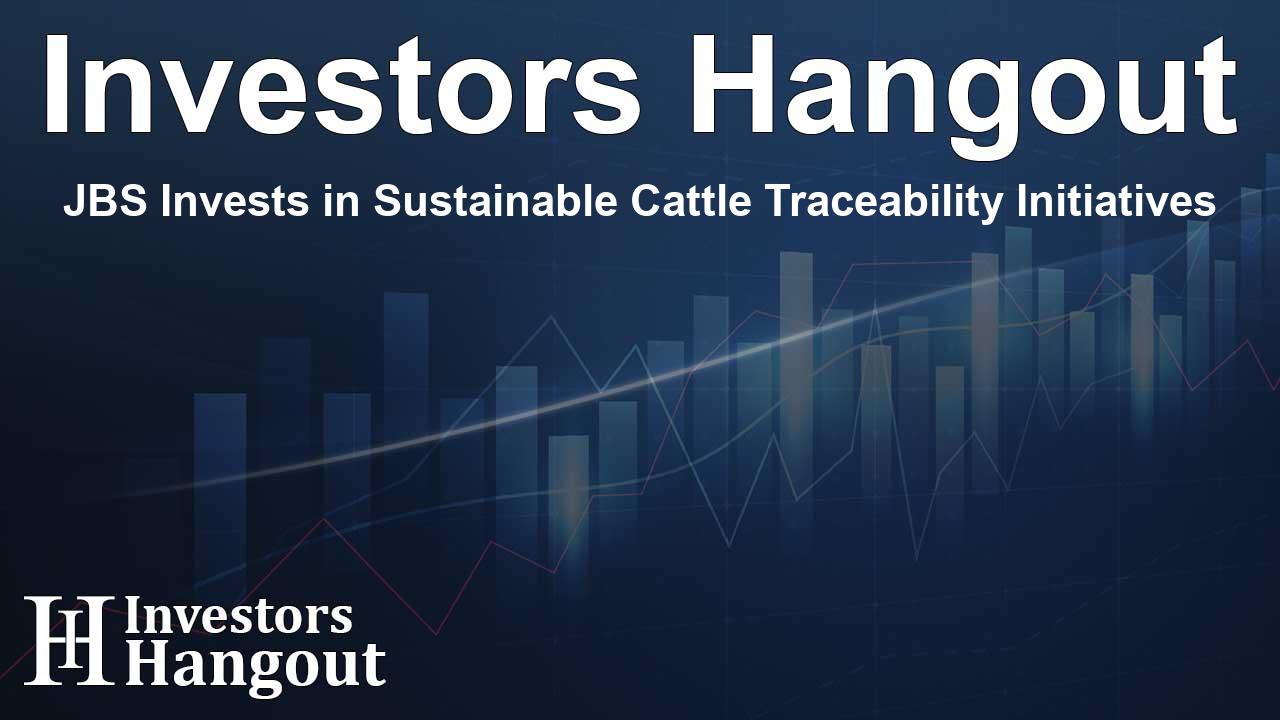JBS Invests in Sustainable Cattle Traceability Initiatives

JBS's Commitment to Sustainable Cattle Farming
In an impressive move towards enhancing sustainability in cattle farming, JBS has invested over US$ 7 million in traceability measures and support for small producers in Pará. This initiative is part of an ambitious state program designed to ensure that every cattle and buffalo herd in the region can be fully traced by 2026. These efforts were showcased during a vital event centered around sustainable meat and leather markets in Brazil.
Investing in Traceability and Small Producers
JBS's commitment involves the donation of 2 million tags to bolster a pioneering program aimed at achieving widespread cattle traceability. The investment supports direct and indirect suppliers and seeks to establish a standard system of oversight over the immense cattle herds in the state. As part of these initiatives, JBS has allocated US$ 5 million for its Traceability Accelerator Program, which focuses on encouraging the use of these identification tags among indirect suppliers.
Implementing the Accelerator Program
The Traceability Accelerator Program is initially focusing on Southeast Pará, between Marabá and Santana do Araguaia. JBS collaborates with local organizations to visit farms and engage with producers, ensuring that trackable identification measures are placed on cattle. This program is set to redefine how cattle tracking is performed in Brazil, facilitating efforts to monitor animals individually throughout the state, which boasts the second-largest cattle herd in the country.
Supporting Local Producers with Green Offices
In conjunction with its traceability initiatives, JBS has located significant resources towards its Green Offices program in Pará, investing US$ 2 million since its inception in 2021. These offices are dedicated to providing free support for the environmental regularization of rural properties, targeting small producers in particular. Through this initiative, JBS aims to aid producers in registering their properties in the Rural Environmental Registry, bringing them into compliance with vital environmental regulations.
Helping Producers Navigate Environmental Regulations
The JBS Green Offices strive not only to streamline the process of registration but also to raise awareness about compliance programs. By assisting producers with lifting embargoes and ensuring they achieve commercial qualification, the offices are fostering a community of sustainable farming practices in the region.
Future Expansion Plans for Traceability
Looking ahead, there are plans to extend the current model to other regions in the state, including Southwest Pará and the Lower Amazon. As the program expands, JBS is also considering replicating this successful model in additional states, spreading sustainable practices throughout the country.
The Impact of JBS's Initiatives
Since the launch of the Green Offices program, remarkable results have been seen on a national scale. The program has led to the regularization of 18,042 farms, while a substantial area of 7,005 hectares is undergoing forest restoration. These numbers signify JBS's serious commitment to sustainability not just in their operations but also in uplifting the entire agricultural community.
Conclusion: A Path Forward for Sustainable Agriculture
JBS is not only a leader in the meat industry but also a key player in advancing sustainable agriculture through innovative programs that promote traceability and support for small producers. By investing in future-ready agricultural practices, JBS is helping pave the way for a more sustainable meat supply chain.
Frequently Asked Questions
What is the primary goal of JBS's investment in Pará?
The primary goal is to enhance cattle traceability and provide support for small producers, aiming for full herd traceability by 2026.
How much has JBS invested in the Traceability Accelerator Program?
JBS has allocated US$ 5 million specifically for the Traceability Accelerator Program.
What services do JBS Green Offices provide?
JBS Green Offices provide free environmental regularization support for rural properties, especially assisting small producers.
What regions will the traceability model expand to?
The model is planned to expand to regions including Southwest Pará and Lower Amazon in the near future.
How many farms have been regularized under JBS's Green Offices program?
So far, 18,042 farms have been regularized as part of the program since its launch in 2021.
About The Author
Contact Dominic Sanders privately here. Or send an email with ATTN: Dominic Sanders as the subject to contact@investorshangout.com.
About Investors Hangout
Investors Hangout is a leading online stock forum for financial discussion and learning, offering a wide range of free tools and resources. It draws in traders of all levels, who exchange market knowledge, investigate trading tactics, and keep an eye on industry developments in real time. Featuring financial articles, stock message boards, quotes, charts, company profiles, and live news updates. Through cooperative learning and a wealth of informational resources, it helps users from novices creating their first portfolios to experts honing their techniques. Join Investors Hangout today: https://investorshangout.com/
The content of this article is based on factual, publicly available information and does not represent legal, financial, or investment advice. Investors Hangout does not offer financial advice, and the author is not a licensed financial advisor. Consult a qualified advisor before making any financial or investment decisions based on this article. This article should not be considered advice to purchase, sell, or hold any securities or other investments. If any of the material provided here is inaccurate, please contact us for corrections.
